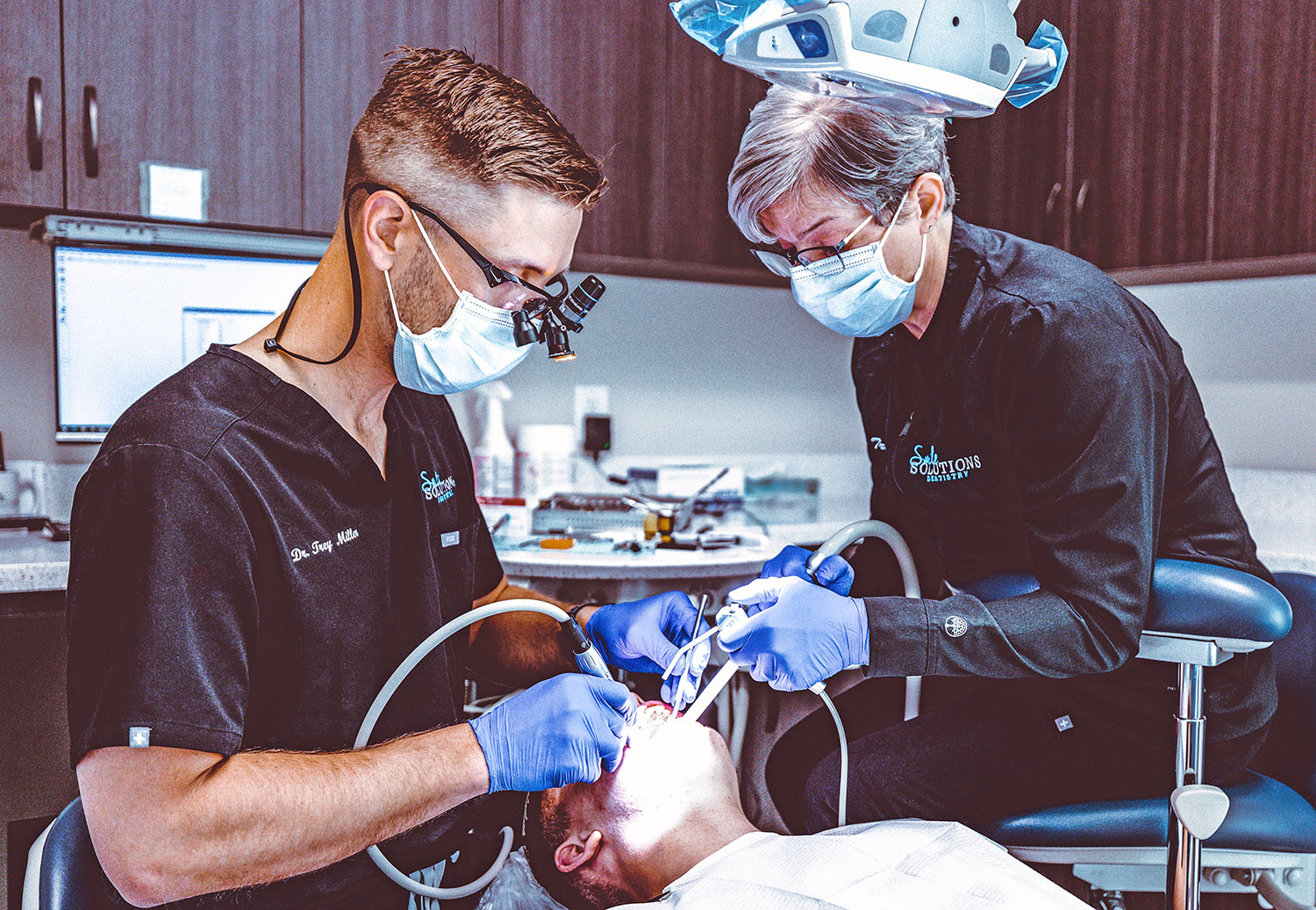The Complete Dental Implant FAQ Guide
Welcome to “The Complete Dental Implant FAQ Guide,” your comprehensive resource for answering all your questions about dental implants. If you’re considering dental implants to restore your smile’s function and aesthetics, you likely have a multitude of inquiries, and we’re here to provide you with clear and informative answers. This article is designed to address every aspect of dental implants, from the basics of what they are and how they work to the specifics of the implant procedure, recovery, aftercare, and more. Whether you’re a prospective patient or simply curious about this transformative dental solution, our goal is to equip you with the knowledge you need to make informed decisions about your oral health. Let’s dive into the world of dental implants and explore all that they have to offer.
Dental implants are generally considered safe when performed by qualified and experienced dental professionals.
What exactly are dental implants?
Dental implants are artificial tooth roots made from biocompatible materials, such as titanium, that are surgically placed into the jawbone to provide a stable foundation for replacement teeth. These replacement teeth, which can be crowns, bridges, or dentures, are custom-made to match the appearance and function of natural teeth. Dental implants serve as a long-lasting and durable solution for individuals with missing teeth, offering the ability to eat, speak, and smile with confidence while preserving jawbone health and preventing the shifting of adjacent teeth. They have become the gold standard in modern dentistry for restoring both the aesthetics and functionality of a natural, healthy smile.
Are there different types of implants?
Yes, there are many different kinds of implants, but we’ll focus on our specific dental implant solutions tailored to meet your unique needs. We offer single tooth implants, which provide a sturdy replacement for individual missing teeth, and all-on-4 and all-on-x implants, which are good solutions for patients seeking full arch restorations with fewer implants. Additionally, we provide removable partial implants, an excellent option for those requiring removable prosthetics with the stability of dental implants. Lastly, our 2 implant supported bridge option offers an effective way to replace multiple adjacent missing teeth by anchoring a bridge securely to two strategically placed implants.
Are dental implants safe?
Yes, dental implants are generally considered safe when performed by qualified and experienced dental professionals. They have a high success rate, often exceeding 95%, and are a well-established and proven dental procedure. The materials used for dental implants, such as titanium, are biocompatible and have a long history of safe use in medical and dental applications. However, like any surgical procedure, there are potential risks and complications, including infection, implant failure, or damage to surrounding structures. These risks are relatively low and can be minimized through proper patient selection, meticulous surgical technique, and post-operative care. It’s crucial to consult with a skilled dentist or oral surgeon who can assess your specific oral health and discuss the benefits and potential risks of dental implants in your particular case.
How long does a dental implant procedure take?
The duration of the dental implant procedure can vary depending on several factors, including the number of implants needed, the condition of the patient’s jawbone, and the complexity of the case. In a straightforward single-tooth implant procedure, it typically takes about 1 to 2 hours. However, for more complex cases or when multiple implants are required, the process may span several months, including the healing time between stages. This involves the initial surgery to place the implant into the jawbone, followed by a healing period during which the implant integrates with the bone (osseointegration). After osseointegration, an abutment and crown are attached to the implant, which can take additional appointments. Your dentist or oral surgeon will provide you with a detailed treatment plan and timeline specific to your needs during the initial consultation.
Do dental implants hurt?
During the dental implant procedure, patients typically experience minimal discomfort due to local anesthesia used to numb the treatment area. Most describe the procedure itself as relatively painless, feeling only pressure or vibrations. However, some post-operative discomfort and swelling are common after the anesthesia wears off, which can usually be managed with over-the-counter pain relievers and subsides within a few days. Severe pain is rare and should be reported to your dentist immediately, as it could indicate a complication. While everyone’s pain threshold and experience may vary, the majority of patients find that the long-term benefits of dental implants, such as restored function and aesthetics, far outweigh the temporary discomfort associated with the procedure. Your dentist will provide you with detailed aftercare instructions to ensure a smoother recovery process.
What does post-operative implant care look like?
Post-operative dental implant care is crucial for a successful recovery and the long-term health of your dental implants. After the procedure, you’ll need to follow specific guidelines, which typically include maintaining good oral hygiene by gently brushing and flossing the treated area as directed by your dentist. Avoiding vigorous rinsing, smoking, and the consumption of hard or crunchy foods is recommended during the initial healing period to prevent disruption of the surgical site. Attending follow-up appointments with your dentist for monitoring and adjustments is essential. It’s also important to adhere to any prescribed medications, such as antibiotics or pain relievers, and contact your dental provider immediately if you experience excessive pain, swelling, or signs of infection. Post-operative care is tailored to your specific case and will be thoroughly explained by your dentist to ensure a smooth recovery and the long-term success of your dental implants.
Can anyone get dental implants?
While dental implants are a highly effective tooth replacement option for many individuals, not everyone is automatically a candidate. Eligibility for dental implants depends on several factors, including your oral health, general health, and bone density. Ideal candidates should have good overall health and healthy gums, as well as enough bone in the jaw to support the implant. However, even if you have experienced bone loss, procedures like bone grafting can often be done to prepare the site for implant placement. Specific medical conditions or habits like smoking may also impact candidacy. To determine if you are a suitable candidate for dental implants, it’s essential to consult with a qualified dentist or oral surgeon who can evaluate your individual circumstances and provide personalized recommendations.
Are dental implants expensive?
Dental implant costs can vary widely based on several factors, including the number of implants needed, the type of restoration (crown, bridge, denture), geographic location, and any additional procedures like bone grafting or sinus lifts. While dental implants may have a higher upfront cost compared to other tooth replacement options, they are often considered a long-term investment due to their durability and longevity. It’s important to discuss the specific cost details with your dentist, including any insurance coverage or financing options available to you. While dental implants may require a higher initial expenditure, many patients find their benefits, including improved oral function and aesthetics, make them a valuable and cost-effective solution over time.
How long do dental implants last?
With proper care and maintenance, dental implants can last for several decades, and in many cases, a lifetime. The key to their longevity lies in maintaining good oral hygiene, including regular brushing and flossing, as well as attending routine dental check-ups. Avoiding habits like smoking and maintaining a healthy lifestyle can also contribute to the long-term success of dental implants. While dental implants are a highly durable tooth replacement option, their lifespan can be influenced by factors such as the patient’s overall health, bone density, and the quality of the implant procedure. Your dentist will provide guidance on how to care for your dental implants and ensure they remain functional and aesthetically pleasing for many years.
Can I eat normally with dental implants?
Yes, one of the significant advantages of dental implants is that they allow you to eat normally and enjoy a wide variety of foods. Dental implants are firmly anchored in the jawbone, providing stability and strength comparable to natural teeth. This means you can confidently bite into and chew most foods without worry. However, it’s important to be cautious with extremely hard or sticky foods that could potentially damage the dental implant or restoration. Additionally, maintaining good oral hygiene and regular dental check-ups is essential to ensure the long-term success of your dental implants and your ability to continue eating normally. Your dentist will provide dietary recommendations specific to your case and implant restoration.
What are some dental implant benefits?
Dental implants offer several significant benefits for individuals with missing teeth. Firstly, they provide a permanent and stable solution, anchoring artificial teeth securely to the jawbone, which not only restores natural chewing and speaking abilities but also prevents bone loss and maintains facial structure. Implants are highly durable, often lasting a lifetime with proper care, eliminating the need for frequent replacements associated with other tooth replacement options like dentures or bridges. Furthermore, they look and feel like natural teeth, enhancing confidence and self-esteem. Dental implants also don’t require adjacent teeth to be altered or compromised, promoting overall oral health. Overall, dental implants offer a long-lasting, aesthetically pleasing, and functional solution for tooth loss.
Conclusion
We hope this article was helpful in your endeavor to learn more about dental implants. We’ve addressed some of the most common questions and concerns, offering insights into the benefits, procedure details, aftercare, and potential risks associated with dental implants. Remember that consulting with a qualified dental professional is crucial to tailor the information to your specific needs and ensure the best possible outcome if you are considering dental implants. Your journey to a confident smile and improved quality of life begins with understanding, and we trust that this guide has been a helpful step in that direction.
If you’re interested in a consultation, you can schedule an appointment and Dr. Trey Miller or one of his colleagues will gladly help you to determine the best course of action.




